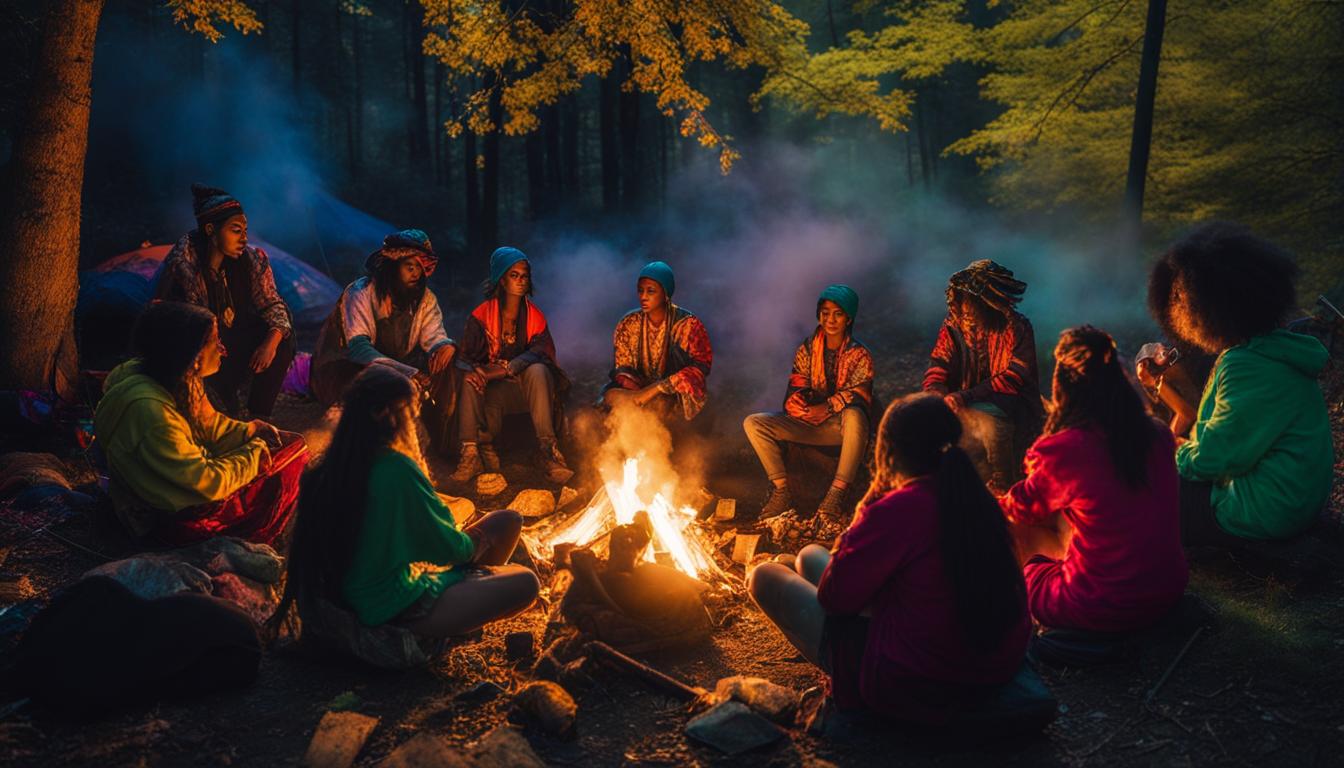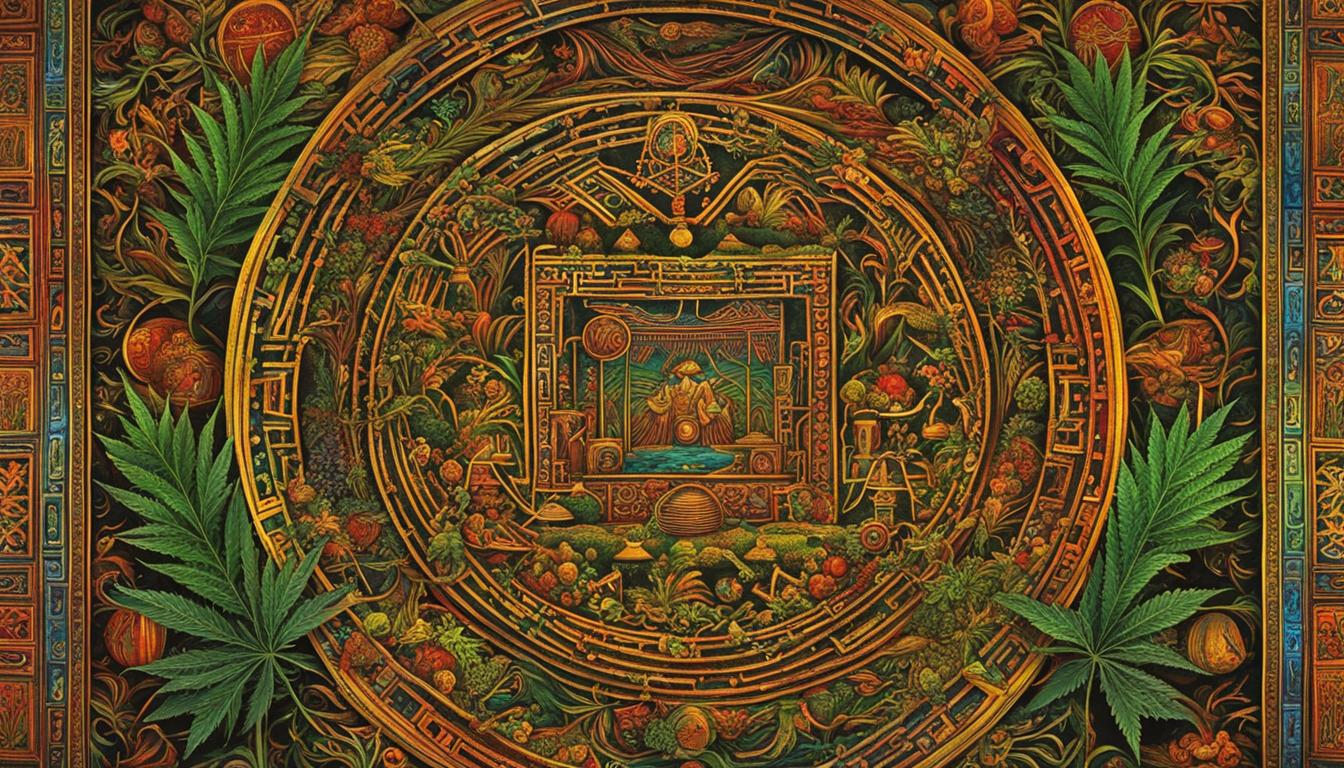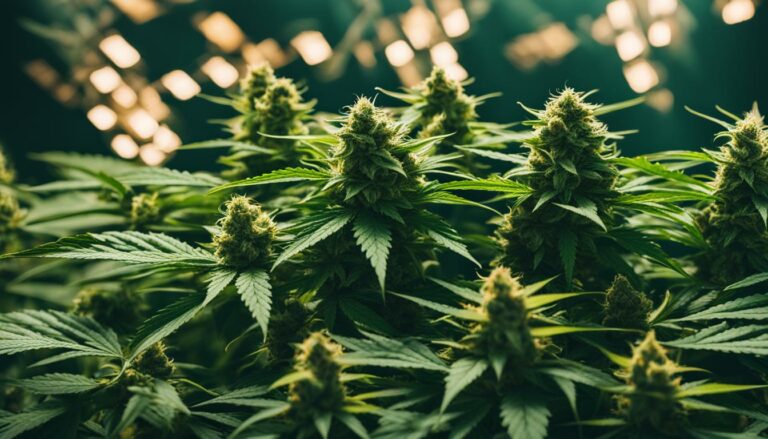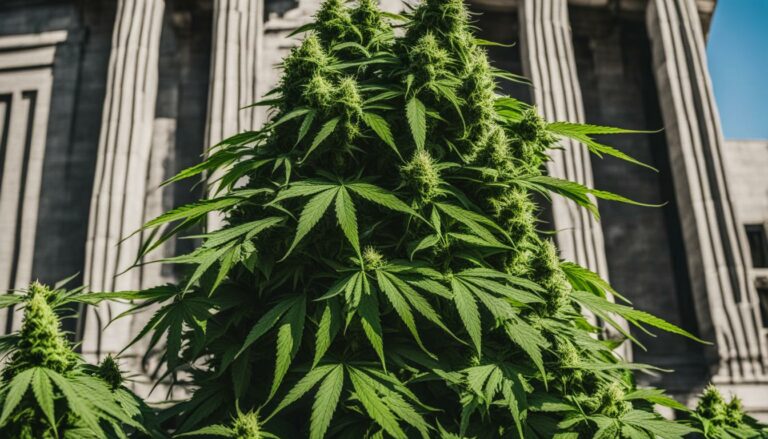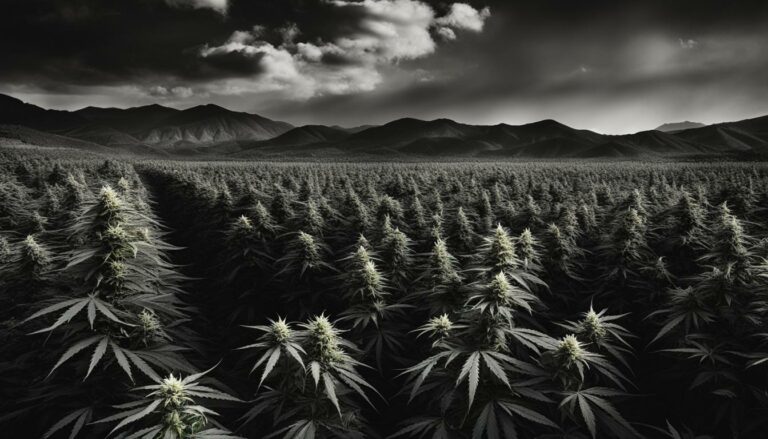The Cultural Shift in Cannabis Consumption
Welcome to a world where cannabis consumption culture is experiencing a remarkable transformation. The traditional cannabis use traditions and marijuana social customs that once dominated are now evolving as perspectives and social acceptance change.
Historical and Traditional Contexts of Cannabis Use
The cultural significance of cannabis extends deep into history, with various ancient societies incorporating the plant into their rituals, traditions, and daily lives. Cannabis lifestyle practices have evolved over time, shaping the way communities engage with weed consumption rituals and cannabis community traditions.
In ancient civilizations such as India and China, cannabis was revered for its medicinal properties and spiritual significance. The Vedas, ancient Hindu texts, mention the use of cannabis as a sacred herb in religious ceremonies. Similarly, ancient Chinese texts highlight its therapeutic properties and inclusion in traditional medicine.
In Native American cultures, cannabis was used ceremonially, as well as for medicinal and recreational purposes. The plant played a vital role in rituals and social gatherings, fostering a sense of community and connection. These weed consumption rituals and cannabis community traditions were integral to the cultural fabric of these societies, promoting unity and harmony.
Exploring the historical and traditional contexts of cannabis use provides valuable insights into the deep-rooted cultural practices and beliefs surrounding the plant. By understanding the influence of these practices on modern cannabis consumption, we can gain a greater appreciation for the cultural shifts and evolving customs in today’s cannabis landscape.
| Historical Contexts | Traditional Practices | Community Traditions |
|---|---|---|
| Ancient Hindu rituals | Medicinal use in Chinese traditional medicine | Native American ceremonial usage |
| Ancient Egyptian references | Spiritual significance in Rastafarian culture | Cannabis festivals and events |
| Greek and Roman historical accounts | Shamanic practices in indigenous cultures | Heritage preservation through storytelling |
As we explore the cultural shifts in cannabis consumption, it is essential to recognize the historical and traditional contexts that have shaped the practices and attitudes surrounding the plant. By embracing the rich tapestry of historical and cultural influences, we can foster a holistic understanding of cannabis lifestyle practices and the significance they hold for different communities.
Cannabis Use and Physical and Mental Health
The rise in cannabis consumption trends has sparked a growing interest in understanding the impact of marijuana social behaviors on physical and mental health. As more individuals turn to cannabis for various reasons, it becomes crucial to explore the potential risks and benefits associated with its use.
One important aspect to consider is the relationship between cannabis use and mental health. Research suggests that cannabis consumption may affect mental well-being, particularly in individuals with pre-existing conditions such as anxiety or depression. While some users may experience temporary relief from symptoms, others may be prone to heightened anxiety or cognitive impairment.
The effects of cannabis on physical health are another area of concern. Regular use of cannabis has been associated with respiratory problems, similar to those caused by smoking tobacco. Additionally, long-term use may impact cognitive function, memory, and motor skills. It is important for individuals to consider these potential health risks when making decisions about cannabis consumption.
| Physical Health Risks | Mental Health Risks |
|---|---|
| Respiratory problems | Anxiety and paranoia |
| Impaired cognitive function | Depression |
| Memory impairment | Psychosis in high-risk individuals |
It is worth noting that individual responses to cannabis can vary widely, and not everyone will experience negative effects. Additionally, cannabis has been used for medicinal purposes, with some evidence suggesting its potential therapeutic benefits for certain conditions like chronic pain and epilepsy. However, further research is needed to fully understand the benefits and risks of cannabis use.
Emerging Cannabis Policies and Impacts
The legalization and decriminalization of cannabis in various countries have brought about significant changes in cultural norms and consumption trends. As cannabis becomes more accepted and accessible, it is essential to examine the impact of these policies on cannabis culture. Understanding the evolving landscape of cannabis consumption can provide valuable insights into the social and behavioral shifts that accompany these changes.
One of the most noticeable impacts of emerging cannabis policies is the normalization of cannabis use. With legalization, cannabis is no longer associated solely with illicit activities. Instead, it is increasingly viewed as a legitimate recreational and medicinal substance. This shift in perception has been accompanied by the growth of a vibrant cannabis culture that embraces cannabis consumption openly and without stigma.
In addition to changing attitudes, cannabis policies have also influenced consumption trends. As legal barriers are lifted, there has been a surge in the availability and diversity of cannabis products. This has led to innovative consumption methods, such as edible cannabis products and concentrates, which appeal to a wider range of consumers. The rise of cannabis tourism in regions where it is legal has also contributed to changes in consumption patterns, as individuals travel specifically to partake in cannabis-related activities.
“The legalization and decriminalization of cannabis have transformed the cultural landscape surrounding cannabis consumption. It has given rise to a new era of openness and acceptance, creating opportunities for individuals to explore the potential benefits and pleasures of cannabis in a safe and regulated environment.”
The Impact of Cannabis Policies on Cultural Norms
The impact of emerging cannabis policies extends beyond consumption trends. It also affects cultural norms surrounding cannabis use. With the legal framework in place, there is an opportunity to shape responsible cannabis consumption norms that prioritize safety and education. This includes promoting responsible use, understanding dosage guidelines, and educating consumers about potential risks and side effects.
Furthermore, cannabis policies have opened up avenues for research and innovation in the cannabis industry. Scientists and researchers can now explore the therapeutic potential of cannabis, leading to advancements in medical treatments and therapies. This integration of cannabis into mainstream healthcare further cements its place in the cultural fabric, enhancing its acceptance and reducing the stigma associated with its use.
| Impacts of Emerging Cannabis Policies | Cultural Shifts |
|---|---|
| Normalization of cannabis use | Growing acceptance and reduction of stigma |
| Diversification of cannabis products | Innovative consumption methods and broader consumer appeal |
| Cannabis tourism | Emergence of destination-based cannabis experiences |
| Promotion of responsible use | Development of safety guidelines and education |
| Advancements in medical research | Integration of cannabis into mainstream healthcare |
Cultural Factors Influencing Cannabis Use
Cannabis consumption is deeply influenced by cultural factors, shaping the norms, beliefs, and behaviors surrounding marijuana use. Understanding these cultural influences is crucial for gaining insights into the motivations and patterns of cannabis consumption.
One significant cultural factor that influences cannabis use is the cannabis consumption culture itself. Different cultures have varied attitudes and traditions related to cannabis, which can shape individuals’ perception and acceptance of its use. For example, in some cultures, cannabis may be viewed as a sacred plant used in spiritual or religious ceremonies, while in others, it may be seen as a recreational substance used for relaxation and socialization.
Cultural norms also play a role in determining acceptable cannabis consumption behaviors. These norms encompass a range of factors, including social customs, peer influence, and community practices. In some cultures, cannabis use may be widely accepted and integrated into social gatherings and events, while in others, it may be stigmatized and heavily regulated.
Cannabis Consumption Culture Norms
It is important to acknowledge that cultural factors can significantly impact an individual’s decision to initiate and continue cannabis use. For example, a study conducted in different countries found that cultural norms had a significant influence on the age of cannabis initiation, with some cultures exhibiting earlier onset of use due to higher acceptance levels and accessibility. These cultural norms can shape individuals’ perceptions of the risks and benefits associated with cannabis use, ultimately influencing their behavior.
The understanding of cultural factors influencing cannabis use can have important implications for public health interventions and policy development. By addressing cultural beliefs and norms surrounding cannabis, tailored prevention and harm reduction strategies can be implemented to minimize potential risks and enhance the wellbeing of individuals within diverse cultural contexts.
| Cultural Factors | Influences on Cannabis Use |
|---|---|
| Social Acceptance | Higher acceptance levels may result in increased cannabis use |
| Religious and Spiritual Beliefs | Cannabis use may be viewed as a sacred practice in some cultures |
| Peer Influence | Friends and social networks can shape individuals’ attitudes towards cannabis use |
| Community Practices | Cannabis use may be integrated into social events and gatherings in certain communities |
Understanding the complex interplay between cannabis consumption culture, cannabis culture norms, and marijuana social behaviors is vital for developing effective strategies that promote responsible cannabis use and minimize potential negative consequences.
Cultural Considerations in Cannabis Disorder Trajectories
The cultural factors surrounding cannabis use have a significant impact on the development and progression of cannabis use disorder. Understanding how cultural norms and social behaviors influence the trajectory of cannabis-related disorders is crucial for effective prevention and intervention strategies.
One key cultural consideration is the normalization of cannabis use within certain societies. In some cultures, cannabis has long been integrated into social rituals and customs, making it more readily accepted and accessible. This normalization can contribute to higher rates of cannabis use and potentially increase the risk of developing a cannabis use disorder.
Additionally, cultural norms surrounding risk-taking behavior and peer influence play a role in cannabis disorder trajectories. In cultures where experimentation and risk-taking are valued, individuals may be more likely to engage in heavy or problematic cannabis use. Peer pressure and social acceptance of cannabis use can also contribute to the development of cannabis use disorder, particularly among younger populations.
Understanding how cultural norms and social behaviors influence the trajectory of cannabis-related disorders is crucial for effective prevention and intervention strategies.
Table: Cultural Factors and Cannabis Disorder Trajectories
| Cultural Factor | Impact on Cannabis Disorder Trajectories |
|---|---|
| Normalization of cannabis use | Potential increase in cannabis use and risk of developing a disorder |
| Cultural norms of risk-taking | Higher likelihood of heavy or problematic cannabis use |
| Peer influence and social acceptance | Contribution to the development of cannabis use disorder, especially among younger populations |
Addressing the cultural factors that contribute to cannabis disorder trajectories requires a multi-faceted approach. Prevention and education programs should target specific cultural norms and beliefs surrounding cannabis use, promoting healthier attitudes and behaviors. Interventions should also consider the role of peer influence and social acceptance, providing support and resources to individuals at risk of developing a cannabis use disorder.
Global Perspectives on Cannabis Use
The consumption of cannabis varies significantly across different cultures and geographical regions, reflecting diverse cultural norms, trends, and traditions related to this plant. Examining global perspectives on cannabis use provides valuable insights into the ever-evolving landscape of cannabis consumption.
One of the notable trends in cannabis consumption is the growing acceptance and legalization of recreational and medicinal cannabis in various countries. This shift in attitudes and policies has led to significant changes in cannabis culture norms worldwide. For example, in countries like Canada and Uruguay, cannabis has been legalized for recreational use, creating a new cultural landscape around its consumption. In contrast, other regions have stricter regulations or criminalization of cannabis, leading to distinct cultural attitudes and practices.
Another aspect to consider when exploring global perspectives on cannabis use is the existence of longstanding cultural traditions and community practices associated with cannabis. From the spiritual and religious significance of cannabis in Rastafarian culture to the ceremonial use of cannabis in indigenous communities, these cultural traditions provide unique insights into cannabis consumption and its role in various societies.
Additionally, the emergence of cannabis tourism in certain regions has fueled international interest in different cannabis cultures and consumption practices. Countries like the Netherlands and certain states in the United States have become popular destinations for cannabis enthusiasts seeking to experience different cultural norms and explore cannabis-related traditions.
| Region | Cannabis Consumption Trends | Cannabis Culture Norms | Cannabis Community Traditions |
|---|---|---|---|
| North America | Increasing acceptance of cannabis for medical and recreational use | Shift towards normalization and destigmatization of cannabis | Emergence of cannabis-friendly events and social gatherings |
| South America | Mixed attitudes with some countries legalizing medicinal cannabis | Influence of traditional cultural practices in certain indigenous communities | Use of cannabis in spiritual and ritualistic contexts |
| Europe | Diverse cannabis policies ranging from legalization to strict prohibition | Variation in cultural attitudes towards cannabis depending on country and region | Historical traditions and cultural influences on cannabis consumption |
| Asia | Mixed legal landscape with some countries imposing severe penalties for cannabis use | Strong cultural stigma surrounding cannabis in many communities | Traditional and historical use of cannabis in certain indigenous cultures |
Understanding global perspectives on cannabis use allows for a comprehensive analysis of the cultural factors, consumption trends, and community traditions associated with this plant. By examining the diverse approaches to cannabis across different regions, valuable insights can be gained to inform discussions, policies, and public discourse surrounding cannabis consumption.

The Cultural Factors and Attitudes Towards Cannabis Legalization
When it comes to the cultural landscape of cannabis consumption, one cannot ignore the influential role it plays in shaping attitudes towards legalization. Cultural factors intricately intertwine with societal values, norms, and beliefs, all of which contribute to the acceptance or rejection of cannabis as a legal substance. Examining these factors is vital in understanding the complex relationship between cannabis culture, norms, and marijuana social behaviors.
A deeper look into the cultural aspects reveals that attitudes towards cannabis legalization are heavily influenced by historical contexts, traditional practices, and community traditions. In countries where cannabis has been deeply ingrained in cultural rituals and ceremonies, the acceptance of legalization tends to be higher. These societies often have a long-standing association with cannabis and view it not only as a recreational substance but also as a spiritual and medicinal tool.
Moreover, cultural factors shape perceptions around the risks and benefits of cannabis use. The prevailing social customs and consumption rituals associated with cannabis influence how individuals perceive its impact on health, relationships, and overall well-being. Cultural norms can either amplify or diminish concerns about the potential negative consequences of cannabis use, thereby influencing attitudes towards legalization.
As the global conversation around cannabis continues, it is crucial to acknowledge and explore the cultural factors that influence attitudes towards legalization. By understanding the intricate relationship between cannabis consumption culture, cannabis culture norms, and marijuana social behaviors, policymakers can make informed decisions that align with societal values and aspirations.
| Factors | Influence on Attitudes Towards Legalization |
|---|---|
| Historical Contexts | Higher acceptance in cultures with deep-rooted traditions of cannabis use |
| Traditional Practices | Impact on views regarding the spiritual and medicinal aspects of cannabis |
| Community Traditions | Perceptions of social norms and customs influencing acceptance or rejection |
| Perceived Risks and Benefits | Influence of cultural norms on concerns about health and well-being |
Cultural Influences on Cannabis Use Behaviors
The cultural landscape surrounding cannabis consumption has experienced a significant shift, reflecting changing perspectives, social acceptance, and usage habits. Cultural factors play a crucial role in shaping cannabis use behaviors and patterns. By exploring the relationship between cultural norms, social customs, and cannabis consumption, we can gain valuable insights into the factors that drive these behaviors.
One key aspect to consider is cannabis consumption trends. These trends are influenced by the cultural context in which they emerge. Cultural norms around cannabis use can vary widely between different communities and regions, leading to diverse consumption patterns. Understanding these trends can help us identify potential risks and develop targeted interventions to promote safe and responsible use.
“Cannabis consumption is not just about the individual act of using the substance; it is deeply intertwined with cultural customs and traditions.” – Dr. Jane Mitchell, cultural anthropologist
Another important factor is the role of marijuana social customs and cannabis community traditions. These customs and traditions shape the social dynamics of cannabis use, creating rituals and practices that are unique to each cultural group. From shared smoking techniques to group gatherings centered around cannabis, these customs contribute to the overall cannabis consumption culture and can influence individual behaviors.
| Cultural Factors | Cannabis Use Behaviors |
|---|---|
| Social acceptance and normalization of cannabis | Influence on frequency and quantity of use |
| Cultural beliefs and attitudes | Impact on motivations for use and perceived benefits |
| Cultural rituals and practices | Shape individual and group consumption patterns |
By examining the cultural influences on cannabis use behaviors, we can better understand the complexities of cannabis consumption and develop strategies that align with cultural norms and customs. This knowledge is crucial for promoting responsible and informed cannabis use within diverse communities.
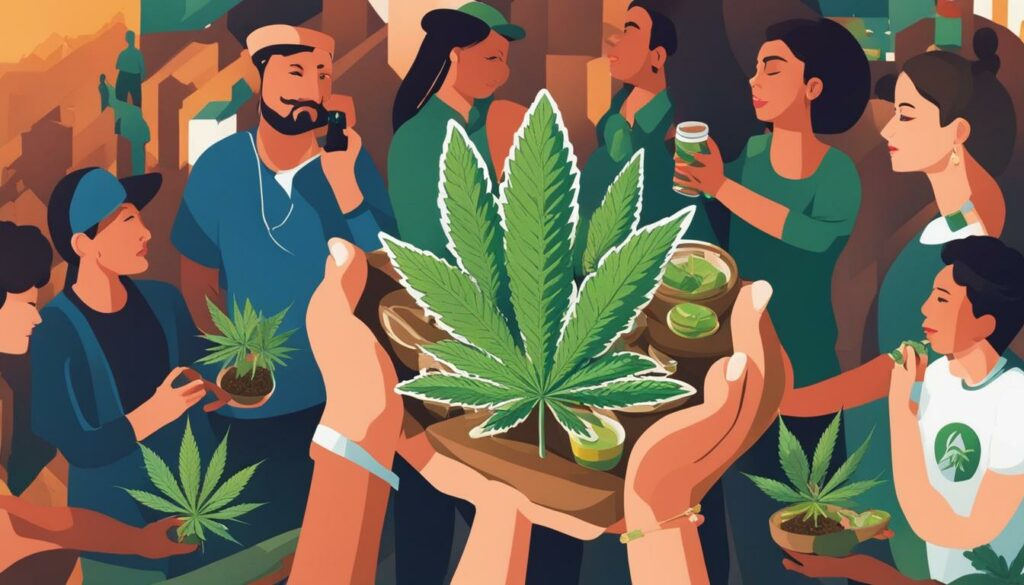
References:
- “Cultural Considerations in Cannabis Use: Exploring the Relationship Between Cultural Norms and Cannabis Consumption” – Cannabis Research Journal
- “The Role of Cultural Influences in Cannabis Use Behaviors” – Journal of Substance Abuse and Cultural Studies
- Mitchell, J. (2020). Cannabis Culture and Customs: A Cultural Anthropological Perspective. Oxford University Press.
Conclusion
The cultural shift in cannabis consumption is a fascinating reflection of changing perspectives, social acceptance, and usage habits. As cannabis becomes more widely accepted, traditional practices and social customs surrounding its use are evolving. This cultural transformation presents both challenges and opportunities that require a deep understanding of cannabis consumption culture, cannabis culture norms, and marijuana social behaviors.
By examining the historical and traditional contexts of cannabis use, we can appreciate the rich cultural significance that cannabis has held throughout various communities. From ancient rituals to modern-day consumption rituals, cannabis has played a prominent role in shaping cultural traditions and practices.
Understanding the impact of cannabis use on physical and mental health is crucial for addressing potential health risks. As cannabis consumption trends continue to change, it is vital to examine how these trends influence social behaviors and well-being.
Examining the impact of emerging cannabis policies on cultural norms and consumption trends provides valuable insights into the changing landscape. By considering the cultural factors that influence cannabis use, we gain a deeper understanding of the motivations and behaviors of cannabis users.
Global perspectives on cannabis use shed light on the diversity of cultural norms, trends, and traditions surrounding its consumption. From different regions to different communities within a region, exploring these perspectives helps us appreciate the complex dynamics of cannabis culture worldwide.
The connection between cultural factors and attitudes towards cannabis legalization is significant. By understanding how culture shapes perceptions and acceptance of cannabis, we can engage in informed discussions and make legislative decisions that align with societal values.
Exploring the relationship between cultural norms, social customs, and cannabis consumption provides insights into the factors that influence use behaviors. This understanding allows for the development of targeted strategies to address the challenges and opportunities associated with cannabis consumption.
In conclusion, the cultural influences on cannabis use are multifaceted and deeply rooted. By embracing these influences and gaining a comprehensive understanding of cannabis consumption culture, cannabis culture norms, and marijuana social behaviors, we can navigate the ever-evolving landscape with informed decision-making and effective strategies.
FAQ
What is the cultural significance of cannabis consumption?
Cannabis has a rich history of ceremonial and traditional use in various cultures, from ancient rituals and spiritual practices to community traditions and consumption rituals.
How does cannabis consumption affect physical and mental health?
The increase in cannabis consumption is accompanied by physical and mental health-related consequences. Understanding the trends in cannabis consumption and their impact on social behaviors is essential for addressing potential health risks.
How have cannabis policies impacted cultural norms and consumption trends?
The legalization and decriminalization of cannabis in various countries have led to shifts in cultural norms and consumption trends. Examining the impact of these policies on cannabis culture can provide insights into the changing landscape.
How do cultural factors influence cannabis consumption habits?
Cultural factors play a significant role in shaping cannabis consumption habits. Understanding the cultural norms, beliefs, and attitudes surrounding cannabis use can shed light on the motivations and behaviors of users.
How do cultural factors impact cannabis use disorder?
Cultural factors can influence the development and progression of cannabis use disorder. Examining the impact of cultural norms and social behaviors on the trajectory of cannabis-related disorders is crucial for effective prevention and intervention strategies.
How does cannabis use vary across different cultures and geographical regions?
Cannabis use varies across different cultures and geographical regions. Examining global perspectives on cannabis consumption can provide insights into the diversity of cultural norms, trends, and traditions related to cannabis.
How do cultural factors influence attitudes towards cannabis legalization?
Attitudes towards cannabis legalization are influenced by cultural factors. Understanding how culture shapes perceptions and acceptance of cannabis can inform legislative decisions and public discourse on the topic.
What is the relationship between cultural factors and cannabis use behaviors and patterns?
Cultural factors can impact cannabis use behaviors and patterns. Exploring the relationship between cultural norms, social customs, and cannabis consumption can provide insights into the factors driving use behaviors.
What does the cultural shift in cannabis consumption reflect?
The cultural shift in cannabis consumption reflects changing perspectives, social acceptance, and usage habits. Understanding the cultural influences on cannabis use is crucial for developing effective strategies to address the challenges and opportunities associated with cannabis consumption.



